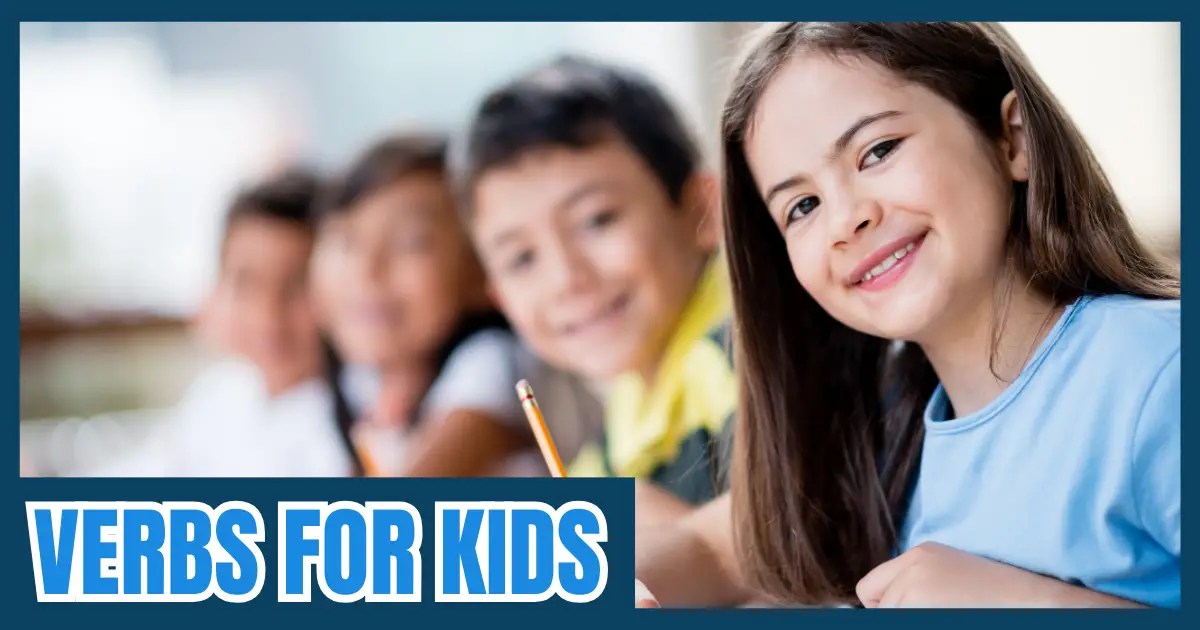200 Verbs For Kids – List Plus Example Sentences
There are so many verbs that kids must learn in order to express themselves confidently and fluently in English. In this post, we have put together a comprehensive list of 200 verbs for kids and organized them into different categories to make learning them more accessible and engaging. You’ll also find an example sentence for each verb so you can see how it is used naturally.
From daily routines and school activities to feelings, social interactions, and more, this collection covers a wide range of verbs that children are likely to encounter and use in their everyday lives.
Verbs For Kids
Action Verbs
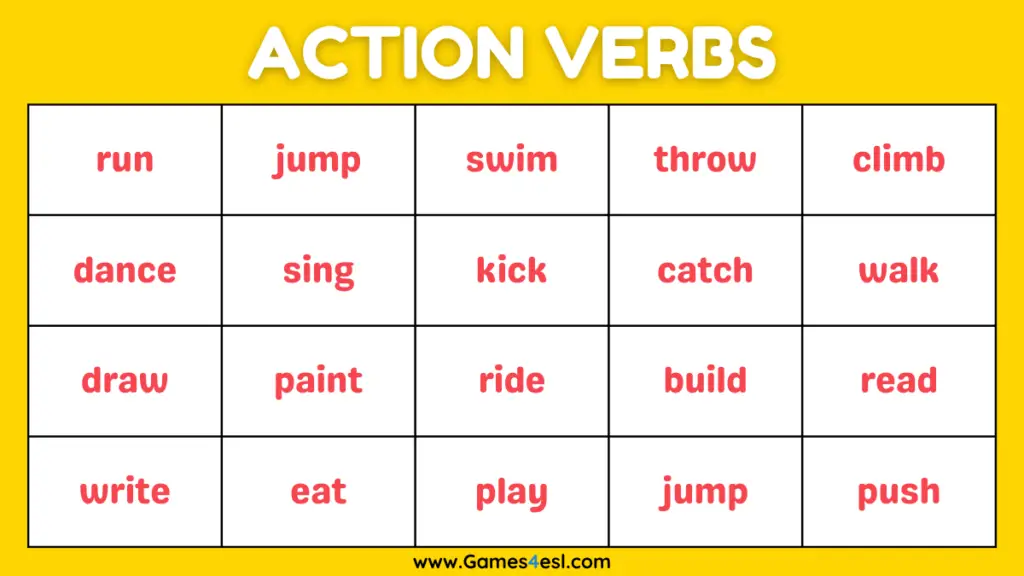
Action verbs are words that describe physical activities or movements that people, animals, or objects can do. These verbs show what someone or something is doing. Here is a list of action verbs kids are likely to use or encounter in their daily lives.
- Run: The dog can run very fast.
- Jump: I like to jump on the trampoline.
- Swim: She can swim in the pool.
- Throw: He can throw the ball far.
- Climb: We climb the tree together.
- Dance: They dance to the music.
- Sing: She sings a happy song.
- Kick: He kicks the soccer ball.
- Catch: I can catch the ball in my hands.
- Walk: We walk to school every day.
- Draw: She likes to draw pictures of animals.
- Paint: He paints with bright colors.
- Ride: I ride my bike around the park.
- Build: They build a tower with blocks.
- Read: She reads a book before bed.
- Write: He writes his name on the paper.
- Eat: We eat lunch at noon.
- Play: They play games in the yard.
- Jump: The frog can jump very high.
- Push: I push the door open.
Daily Routine Verbs
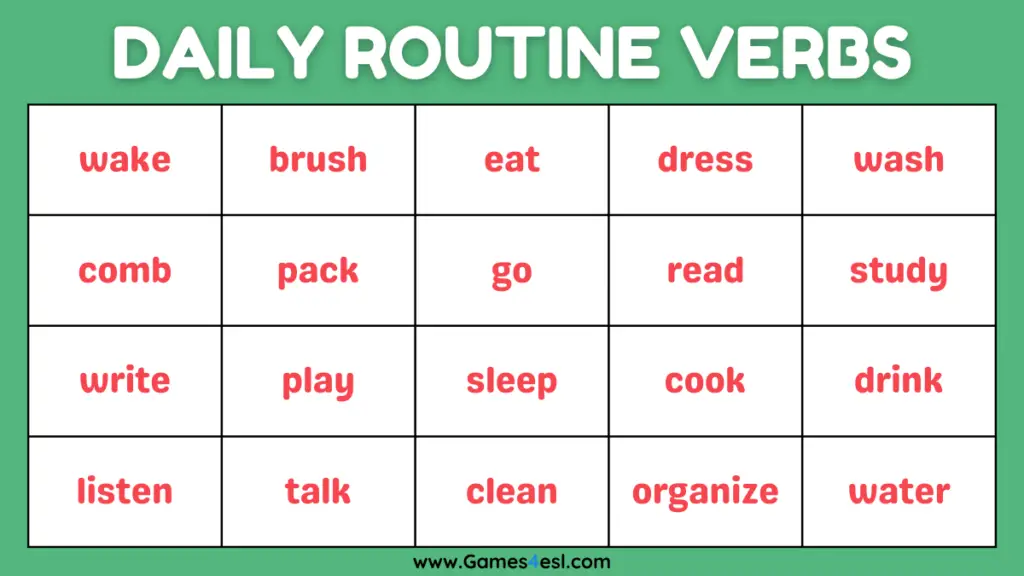
Daily routine verbs are words that describe the activities we do every day as part of our regular schedule. These verbs help us talk about things we do from morning until night. Here is a list of daily routine verbs kids are likely to use or encounter in their daily lives.
- Wake: I wake up early in the morning.
- Brush: She brushes her teeth after breakfast.
- Eat: We eat dinner together every night.
- Dress: He dresses himself in the morning.
- Wash: She washes her hands before eating.
- Comb: He combs his hair after a shower.
- Pack: I pack my bag for school.
- Go: They go to school on the bus.
- Read: He reads a book before going to bed.
- Study: She studies her lessons after school.
- Write: He writes in his journal every night.
- Play: We play outside after school.
- Sleep: I sleep in my bed at night.
- Cook: She helps her mom cook dinner.
- Drink: He drinks a glass of milk before bed.
- Listen: We listen to music while we eat breakfast.
- Talk: They talk about their day at dinner.
- Clean: She cleans her room every weekend.
- Exercise: He exercises every morning before school.
- Rest: I rest on the couch after school.
School-Related Verbs
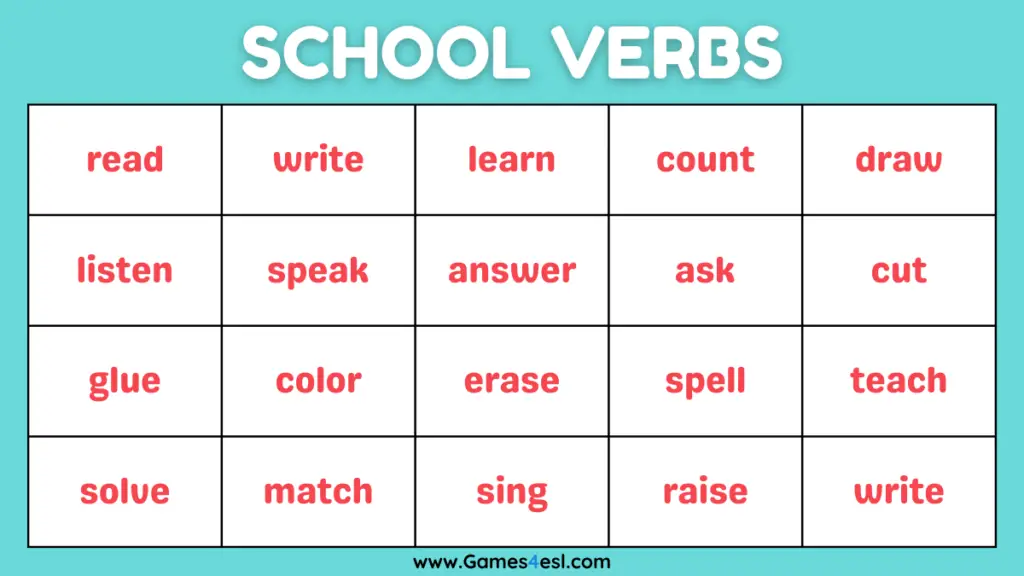
School-related verbs are words that describe the actions and activities that happen in a school setting. These verbs help us talk about what we do in the classroom and during learning time. Here is a list of school-related verbs kids are likely to use or encounter in their daily school activities.
- Read: We read stories in class every day.
- Write: She writes her name on the worksheet.
- Learn: He learns new things at school.
- Count: I can count from one to ten.
- Draw: They draw pictures with crayons.
- Listen: We listen to the teacher during lessons.
- Speak: She speaks clearly in front of the class.
- Answer: He answers the question correctly.
- Ask: I ask the teacher for help.
- Cut: She cuts the paper with scissors.
- Glue: We glue the pieces together to make a picture.
- Color: He colors the picture with bright markers.
- Erase: I erase the mistake with my eraser.
- Share: We share our books with our friends.
- Raise: She raises her hand to ask a question.
- Spell: He can spell simple words like “cat.”
- Teach: The teacher teaches us how to read.
- Solve: We solve math problems on the board.
- Match: She matches the words with the pictures.
- Sing: We sing songs during music class.
Household Chores Verbs
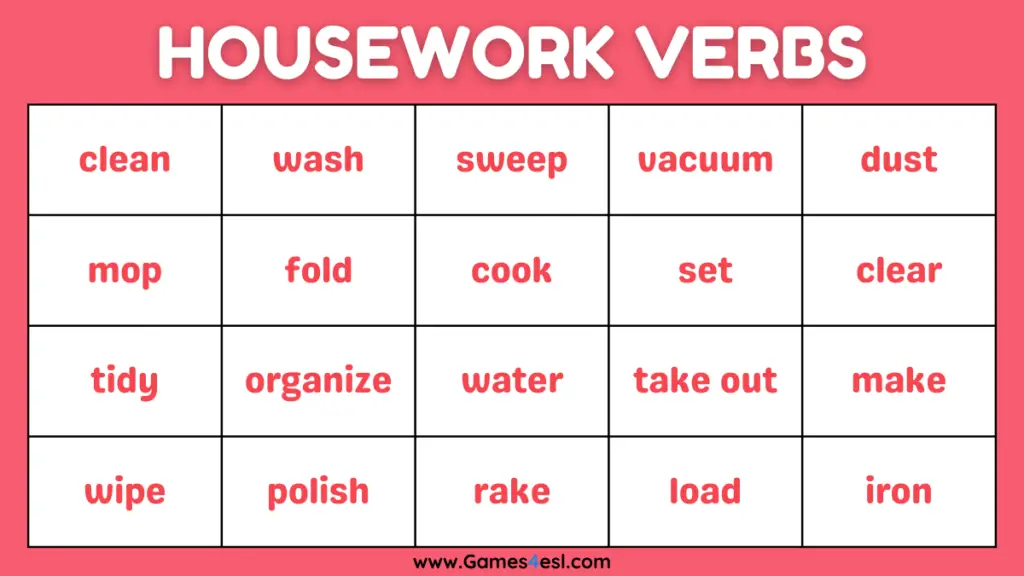
Household chores verbs are words that describe the tasks and activities we do to help keep our homes clean and organized. These verbs are often part of everyday responsibilities at home. Here is a list of household chores verbs kids are likely to use or encounter as they help around the house.
- Clean: I clean my room every Saturday.
- Wash: She washes the dishes after dinner.
- Sweep: He sweeps the floor with a broom.
- Vacuum: We vacuum the carpet in the living room.
- Dust: She dusts the shelves in the living room.
- Mop: He mops the kitchen floor after dinner.
- Fold: I fold the laundry after it dries.
- Cook: They help cook dinner in the kitchen.
- Set: She sets the table before dinner.
- Clear: He clears the table after eating.
- Tidy: I tidy up my toys before bed.
- Organize: She organizes her books on the shelf.
- Water: He waters the plants in the garden.
- Take Out: I take out the trash every evening.
- Make: She makes her bed every morning.
- Wipe: He wipes the table after lunch.
- Iron: We iron our clothes before wearing them.
- Polish: She polishes the silverware before guests arrive.
- Rake: He rakes the leaves in the yard.
- Load: I help load the dishwasher after meals.
Transport and Travel Verbs
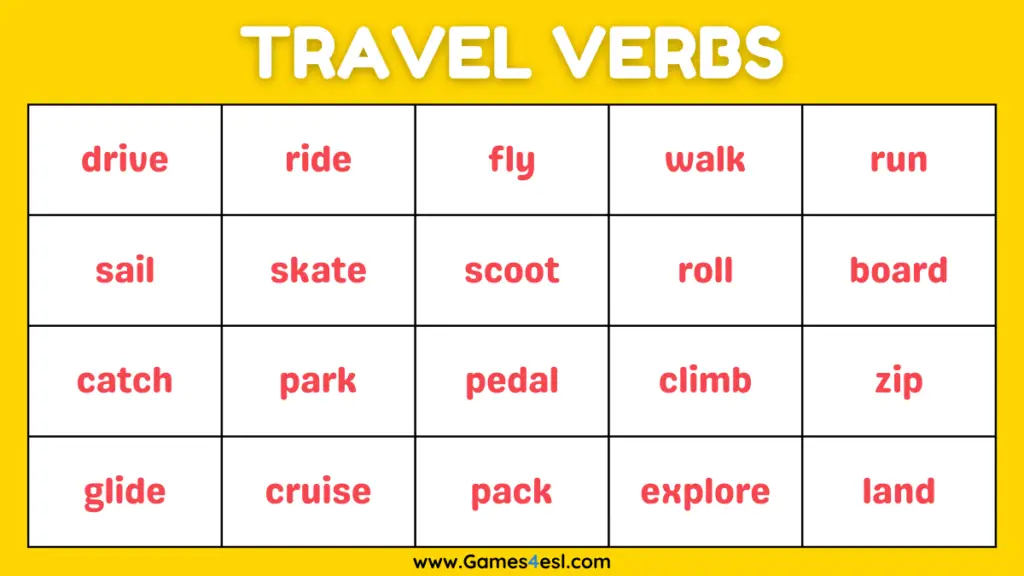
Transport and travel verbs are words that describe the actions related to moving from one place to another, whether by vehicle, on foot, or using other means. These verbs are useful for talking about how we travel and explore different places. Here is a list of transport and travel verbs kids are likely to use or encounter in their everyday lives.
- Drive: Dad drives us to school every morning.
- Ride: I ride my bike around the neighborhood.
- Fly: We fly in an airplane to visit Grandma.
- Walk: She walks to the park with her friends.
- Run: He runs to catch the bus.
- Sail: They sail on a boat across the lake.
- Skate: I like to skate at the ice rink.
- Scoot: She scoots to school on her scooter.
- Roll: He rolls the suitcase down the hallway.
- Board: We board the train at the station.
- Catch: She catches the bus on time every day.
- Park: He parks the car in the driveway.
- Pedal: I pedal fast on my bike to go uphill.
- Climb: We climb into the car for a road trip.
- Zip: She zips through traffic on her scooter.
- Glide: He glides down the street on his skateboard.
- Cruise: We cruise on the highway in our car.
- Pack: I pack my suitcase for the trip.
- Explore: They explore the city on foot.
- Land: The plane lands safely at the airport.
Verbs of Body Movement
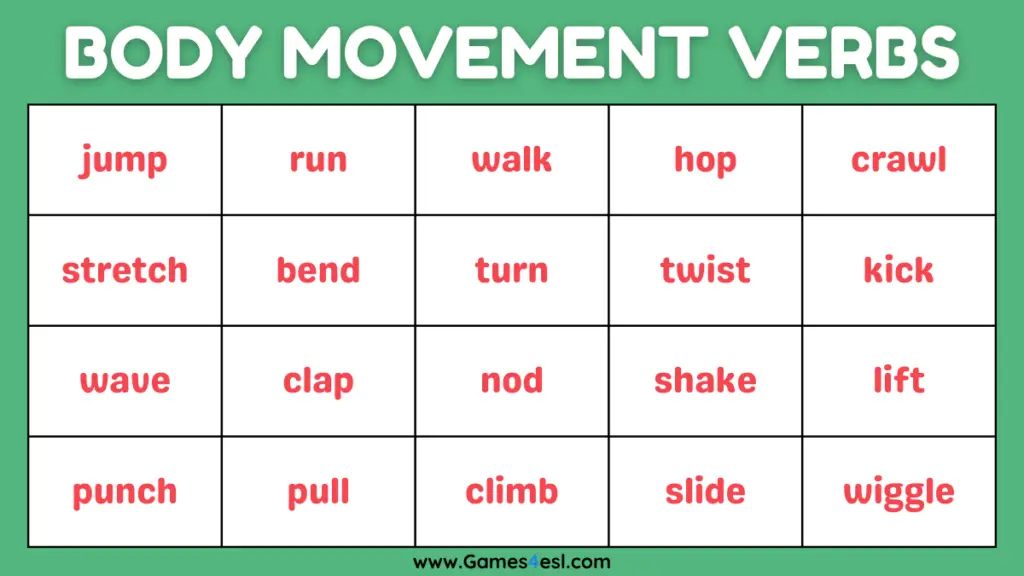
Verbs of body movement are words that describe the various actions we can do with our bodies, like moving different parts or changing positions. These verbs help us talk about how we move and interact with the world around us. Here is a list of verbs of body movement kids are likely to use or encounter in their daily activities.
- Jump: I jump up high to reach the shelf.
- Run: She runs fast in the playground.
- Walk: We walk slowly down the street.
- Hop: He hops on one foot across the room.
- Crawl: The baby crawls on the floor.
- Stretch: I stretch my arms when I wake up.
- Bend: She bends down to pick up her toy.
- Turn: He turns around to see his friend.
- Twist: I twist the cap off the bottle.
- Kick: She kicks the ball into the net.
- Wave: He waves goodbye to his mom.
- Clap: We clap our hands to the music.
- Nod: She nods her head to say yes.
- Shake: He shakes his head to say no.
- Lift: I lift the box onto the table.
- Punch: He punches the air like a superhero.
- Stomp: She stomps her feet in the puddle.
- Squat: We squat down to tie our shoes.
- Wiggle: He wiggles his fingers to make us laugh.
- Leap: The cat leaps from one chair to another.
Cooking Verbs
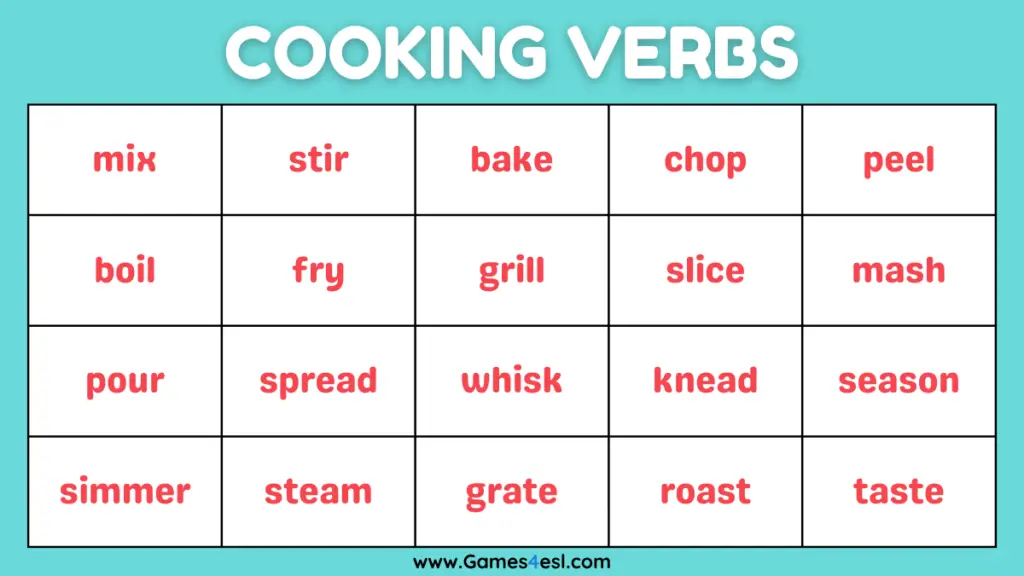
Cooking verbs are words that describe the actions we do when preparing and making food. These verbs are essential for talking about different steps in cooking, from simple tasks to more complex ones. Here is a list of cooking verbs kids are likely to use or encounter in the kitchen.
- Mix: I mix the ingredients in a big bowl.
- Stir: She stirs the soup with a spoon.
- Bake: We bake cookies in the oven.
- Chop: He chops the vegetables into small pieces.
- Peel: I peel the banana before eating it.
- Boil: She boils the water for pasta.
- Fry: He fries the eggs in a pan.
- Grill: We grill the burgers on the barbecue.
- Slice: She slices the bread with a knife.
- Mash: He mashes the potatoes with a fork.
- Pour: I pour the juice into the glass.
- Spread: She spreads butter on the toast.
- Whisk: He whisks the eggs for the omelet.
- Knead: We knead the dough for the pizza.
- Season: She seasons the soup with salt and pepper.
- Simmer: He simmers the sauce on low heat.
- Steam: We steam the broccoli in the pot.
- Grate: She grates the cheese for the pasta.
- Roast: He roasts the chicken in the oven.
- Taste: I taste the soup to check the flavor.
Sports and Exercise Verbs
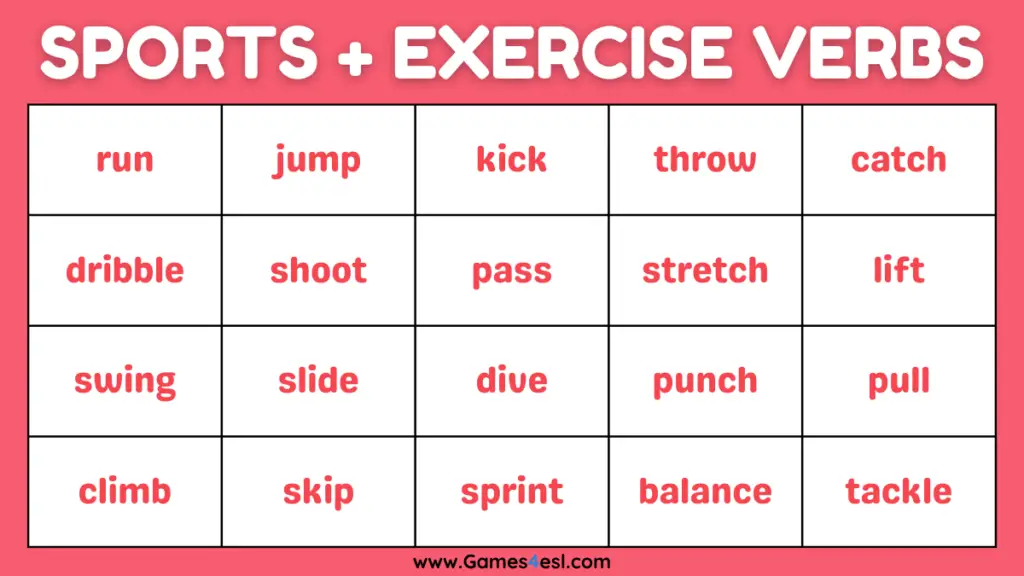
Sports and exercise verbs are words that describe the actions we do when playing sports or staying active. These verbs help us talk about different movements and activities that keep us fit and healthy. Here is a list of sports and exercise verbs kids are likely to use or encounter during physical activities.
- Run: I run fast during the race.
- Jump: She jumps over the hurdles on the track.
- Kick: He kicks the soccer ball into the goal.
- Throw: We throw the basketball into the hoop.
- Catch: She catches the baseball with her glove.
- Dribble: He dribbles the basketball down the court.
- Shoot: I shoot the ball into the basket.
- Pass: She passes the ball to her teammate.
- Stretch: We stretch our muscles before exercising.
- Lift: He lifts the weights at the gym.
- Swing: She swings the bat to hit the ball.
- Slide: I slide into home base during the game.
- Kick: He kicks the ball to score a goal.
- Dive: She dives into the pool with a splash.
- Punch: He punches the punching bag at the gym.
- Pull: We pull the rope in a tug-of-war game.
- Climb: She climbs the rock wall at the gym.
- Skip: He skips with a rope in the playground.
- Sprint: I sprint to the finish line in the race.
- Balance: She balances on one foot during yoga.
Feelings and Emotions Verbs
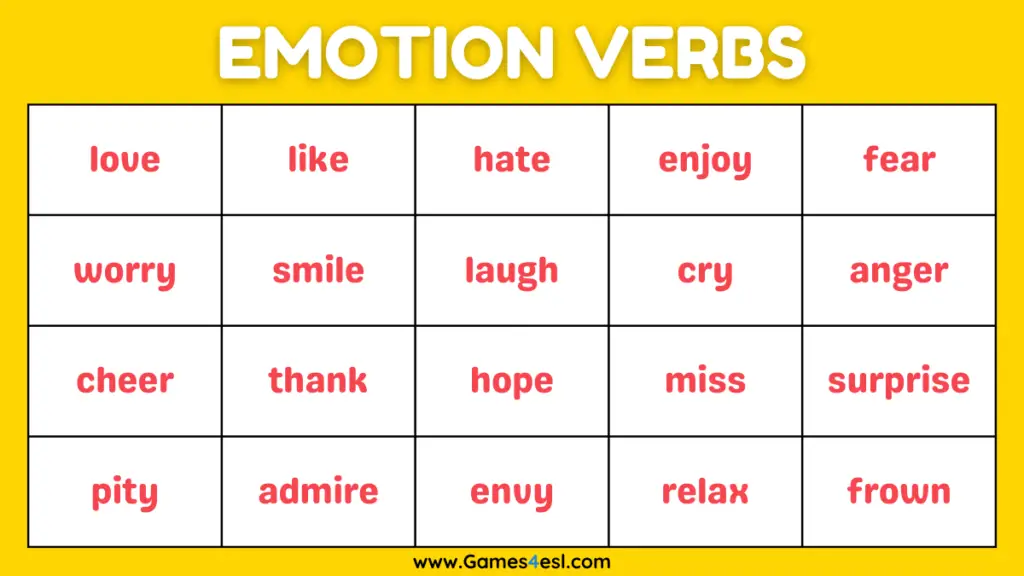
Feelings and emotions verbs are words that describe how we feel inside and express our emotions. These verbs help us talk about different emotional states and reactions. Here is a list of feelings and emotions verbs kids are likely to use or encounter in their daily lives.
- Love: I love my family very much.
- Like: She likes playing with her friends.
- Hate: He hates eating broccoli.
- Enjoy: We enjoy going to the park.
- Fear: She fears the dark at night.
- Worry: He worries about his math test.
- Smile: I smile when I’m happy.
- Laugh: She laughs at the funny joke.
- Cry: He cries when he feels sad.
- Anger: I anger easily when I’m tired.
- Cheer: They cheer for their team during the game.
- Thank: She thanks her friend for the gift.
- Hope: I hope it doesn’t rain tomorrow.
- Miss: He misses his friend who moved away.
- Surprise: She surprises me with a birthday cake.
- Pity: We pity the lost kitten in the rain.
- Admire: He admires his big brother.
- Jealous: She feels jealous when her friend gets a new toy.
- Relax: I relax on the couch after school.
- Frown: He frowns when he’s confused.
Verbs for Manners and Social Interactions
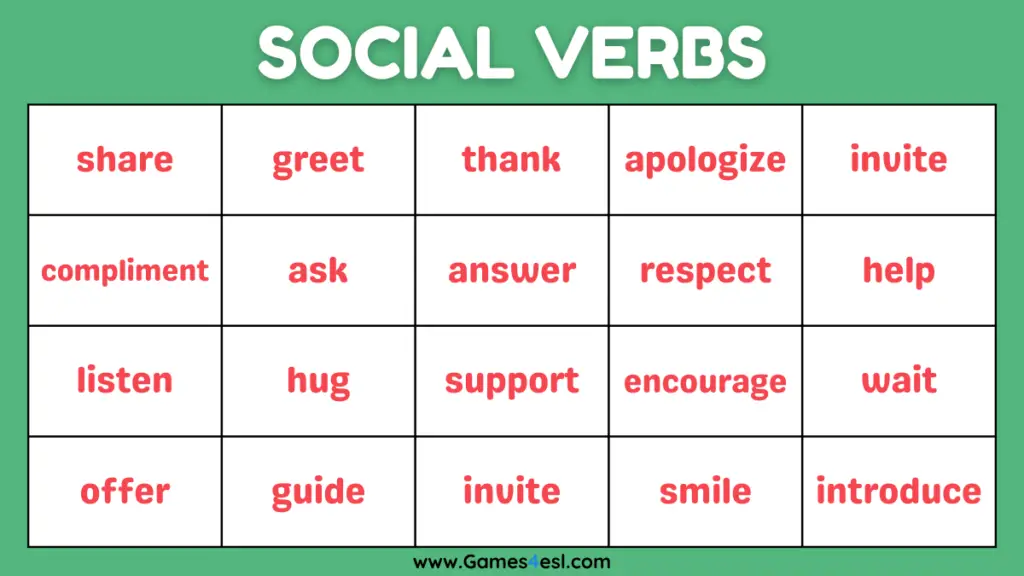
Verbs for manners and social interactions are words that describe actions related to polite behavior and how we communicate with others. These verbs help us talk about expressing respect, kindness, and effective communication. Here is a list of verbs for manners and social interactions that kids are likely to use or encounter in their daily lives.
- Share: I share my toys with my friends.
- Greet: She greets her neighbors with a wave.
- Thank: He thanks his teacher for the help.
- Apologize: I apologize if I bump into someone.
- Invite: We invite our friends to the birthday party.
- Compliment: She compliments her friend on their new dress.
- Ask: He asks politely for a turn on the swing.
- Answer: I answer questions in class.
- Respect: She respects others’ opinions.
- Help: He helps his little brother with homework.
- Listen: We listen carefully to the teacher.
- Hug: I hug my parents goodnight.
- Support: She supports her friend at the game.
- Encourage: He encourages his teammates during practice.
- Wait: I wait my turn in line patiently.
- Wait: He waits quietly before speaking.
- Offer: She offers her seat to an elderly person.
- Guide: He guides his friend to the right classroom.
- Invite: I invite my friends to play with me.
- Smile: She smiles when she meets someone new.
Verbs For Kids PowerPoint
To help you display these verbs for kids in class, download the PowerPoint below. You can also print the verb lists using the same PPT.
Related Resources
Verbs Explained – An Easy Guide To Verbs In English
Action Verbs Lesson Plan
Action Verbs Quiz
Phrasal Verb Examples

